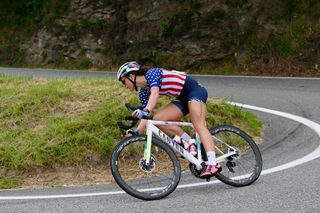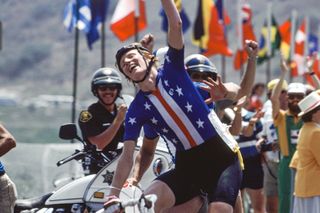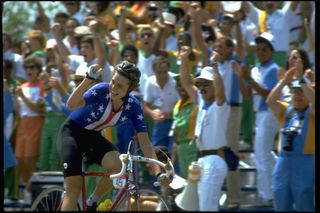The women’s Olympic road race will take place this weekend, on August 4 at 8 a.m. ET, and 95 women will be fighting for a chance at a medal.
For the two American women racing, Chloé Dygert and Kristen Faulkner, there is extra motivation on the line knowing that no American woman has medaled in Olympic road racing in 40 years.
A Dynamic Duo Pulling Double Duty

(Image credit: Getty Images)
Dygert is no stranger to rising to the occasion at the Olympics; she is now a three-time medalist, having earned her third medal – a silver one – in the individual time trial just a few days ago.
This will be Faulkner’s first Olympics, and after rising to professional cycling prowess on an accelerated timeline after only learning to ride competitively in 2020, the Alaskan is likely to be hungry to make a name for herself in Paris.
Both Dygert and Faulkner are pulling double duty for Team USA. In addition to the road event(s), they are also integral parts of the Team Pursuit on the velodrome.
While Team USA has medaled in the Team Pursuit in the past three Olympics, there’s history to be made in the road race. The last time an American woman medaled in the road race was in the very first Olympic road race in 1984, when Connie Carpenter and Rebecca Twigg took gold and silver, respectively.
Connie Carpenter

(Image credit: United States Olympic and Paralympic Museum)
Considered one of the greats of women’s cycling, Connie Carpenter-Phinney (yes, that Phinney. She’s married to Davis Phinney and Taylor Phinney is their son) made history by being the first, and so far only, American woman to earn a gold medal in the Olympic road race.
The latest race content, interviews, features, reviews and expert buying guides, direct to your inbox!
She took the top spot on the Olympic podium in 1984, which was the debut year for women’s road racing in the Games.
For Carpenter-Phinney those 1984 weren’t her first Olympics, however. She began her sporting career as a long-distance speed skater and competed in the 1972 Sapporo Winter Olympics when she was 14 years old. She placed seventh in the 1,500-meter speed skating event.
After a speed skating-induced ankle injury sidelined her in 1976, Carpenter-Phinney picked up cycling to cross-train and quickly became a dual-elite athlete.
She found a second love in cycling and began competing in bike races in the late 1970s, winning 12 total U.S. national titles in road and track cycling before being selected for Team USA for the inaugural women’s Olympic road race. The race consisted of a 79.2-kilometre route through Los Angeles, where she edged out her teammate Rebecca Twigg, winning gold by just half a wheel length at the finish line.
Carpenter-Phinney is also a seasoned rower who helped the UC Berkeley women’s crew team win the 1980 national championship for women’s coxless fours.
Since her incredible achievement at the 1984 Games, Carpenter-Phinney has been inducted into the U.S. Bicycling Hall of Fame, married, and raised two athletically talented children: Kelsey Phinney, a Nordic ski racer, and Taylor Phinney, a now-retired former professional cyclist and Olympian.
Rebecca Twigg

(Image credit: Getty Images)
Rebecca Twigg, now in her early 60s, has had nearly the polar opposite experience post-Olympic medal as Carpenter-Phinney.
Twigg discovered cycling at a young age and, like Carpenter-Phinney, took to it with ease and joy, saying that the only time she fell was when she realized on a ride as a child that she didn’t know how to stop and barreled into a wall.
She was scouted at age 17 by famous cycling coach Eddie Borysewicz who helped her kick off her cycling career first in road racing, and then in track, specifically, the individual pursuit. At her peak, Twigg was racing more than 60 times per year.
The Seattle-born cyclist rose to tremendous fame in the 1980s and 90s winning six cycling world championships and two Olympic medals across three Games.
Twigg’s first Olympics started with a bang: she represented the U.S. in the women’s road race, where she earned a silver medal next to Carpenter-Phinney’s gold one.
She then returned to the Games at the 1992 Barcelona Olympics where she earned a bronze medal in the 3,000-meter individual pursuit. Her final Olympics appearance was at the 1996 Atlanta Olympics where she placed fifth in the same event.
Despite her tremendous success in cycling, Twigg has struggled in her post-Olympic days and as of 2019 considered herself homeless, according to the Seattle Times.
Twigg shared in the Seattle Times article that trying to work a more traditional job after the thrill of her cycling career didn’t resonate with her and she never found a “good fit” after being so in love with her previous job of professional cycling.
Twigg said she vacillates between living with friends and family, in homeless shelters and even under garbage bags on the street downtown. It has been years since she rode a bike.
Twigg is not addicted to drugs or alcohol, but described herself as “confused” with what to do with her life.
“Some of the hard days are really painful when you’re training for racing,” Twigg said in the Seattle Times article, “but being homeless, when you have little hope or knowledge of where the finish line is going to be, is just as hard.”
As Dygert and Faulkner kit up for the women’s road race on August 4, they will undoubtedly be gunning to break the 40 year drought of U.S.-earned medals in the women’s road race, knowing that they have some very big and very meaningful shoes to fill.

